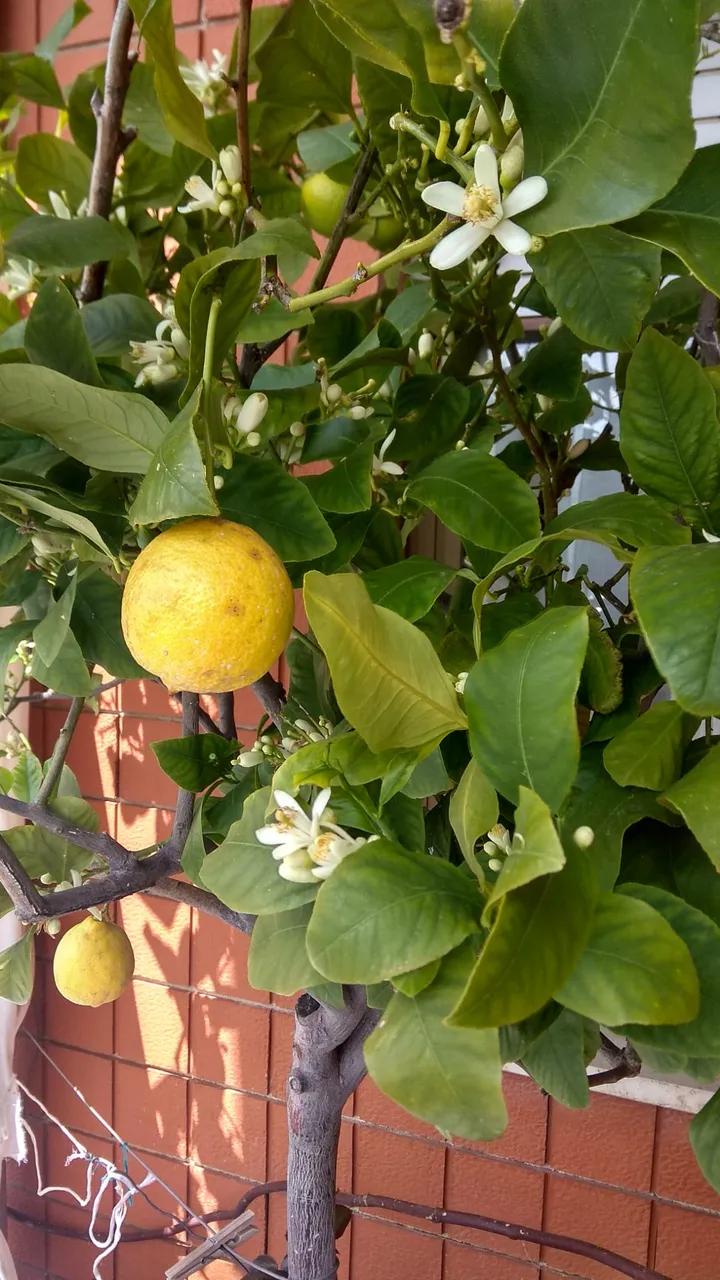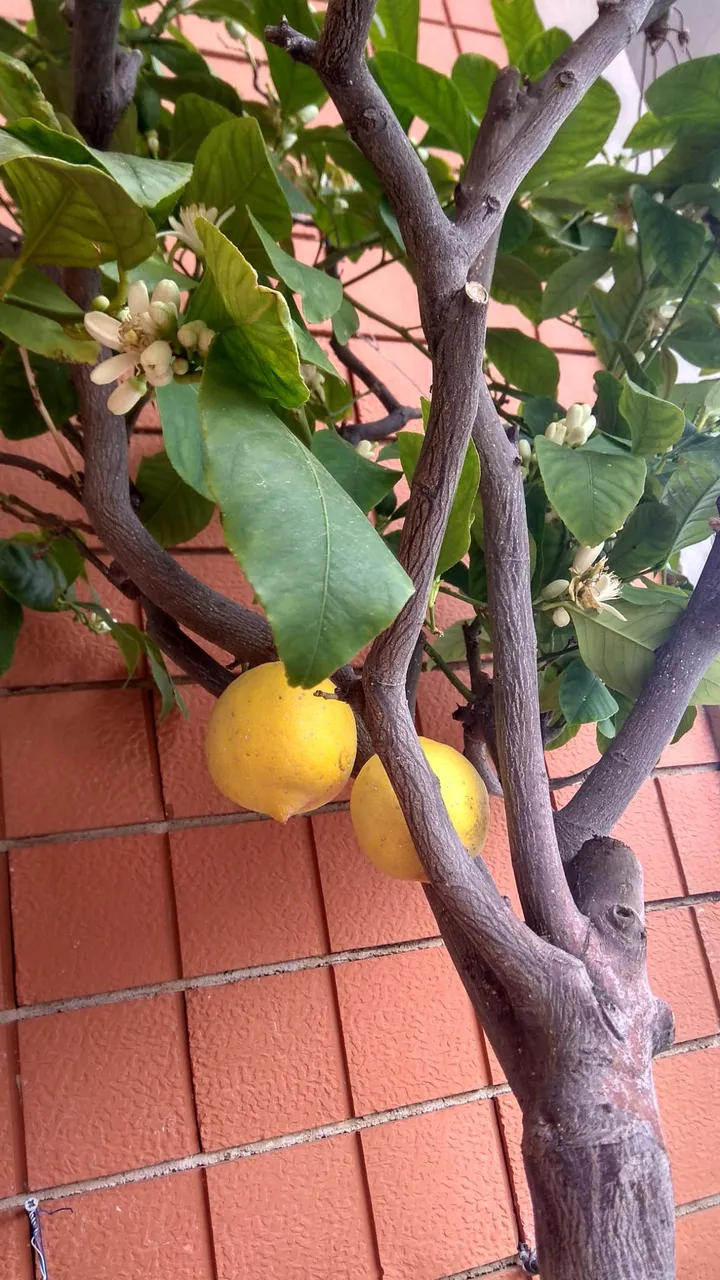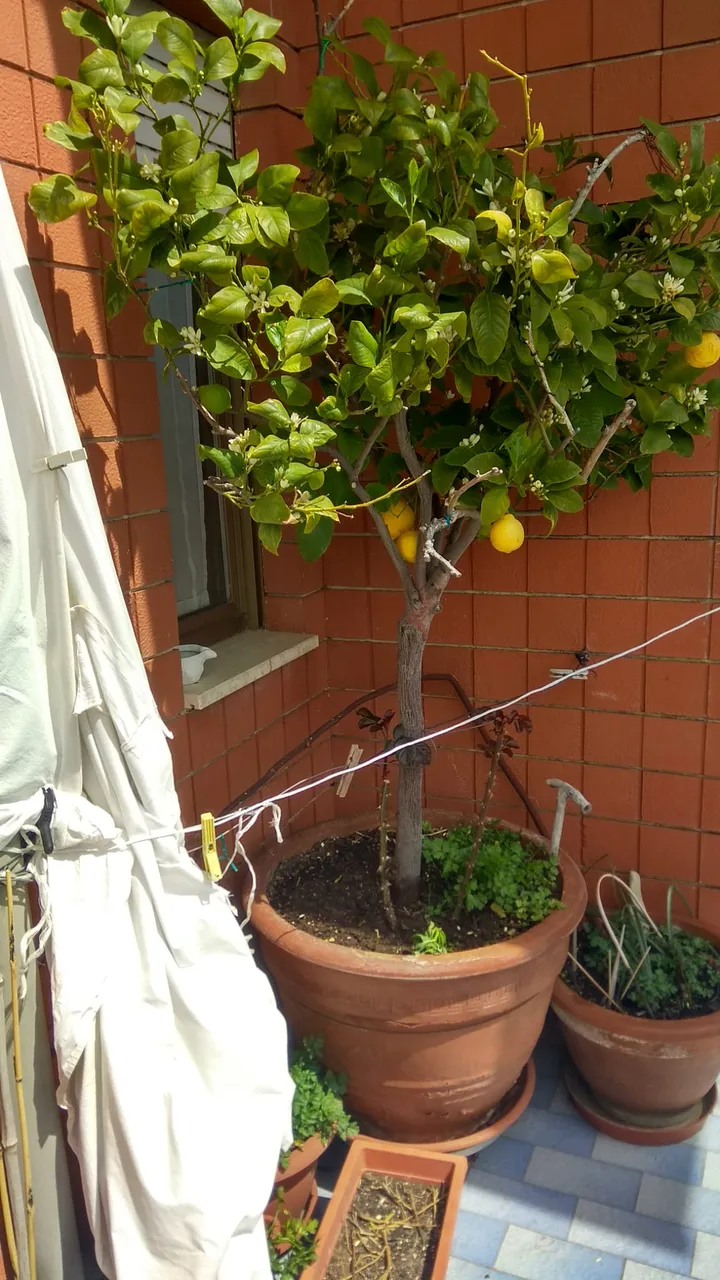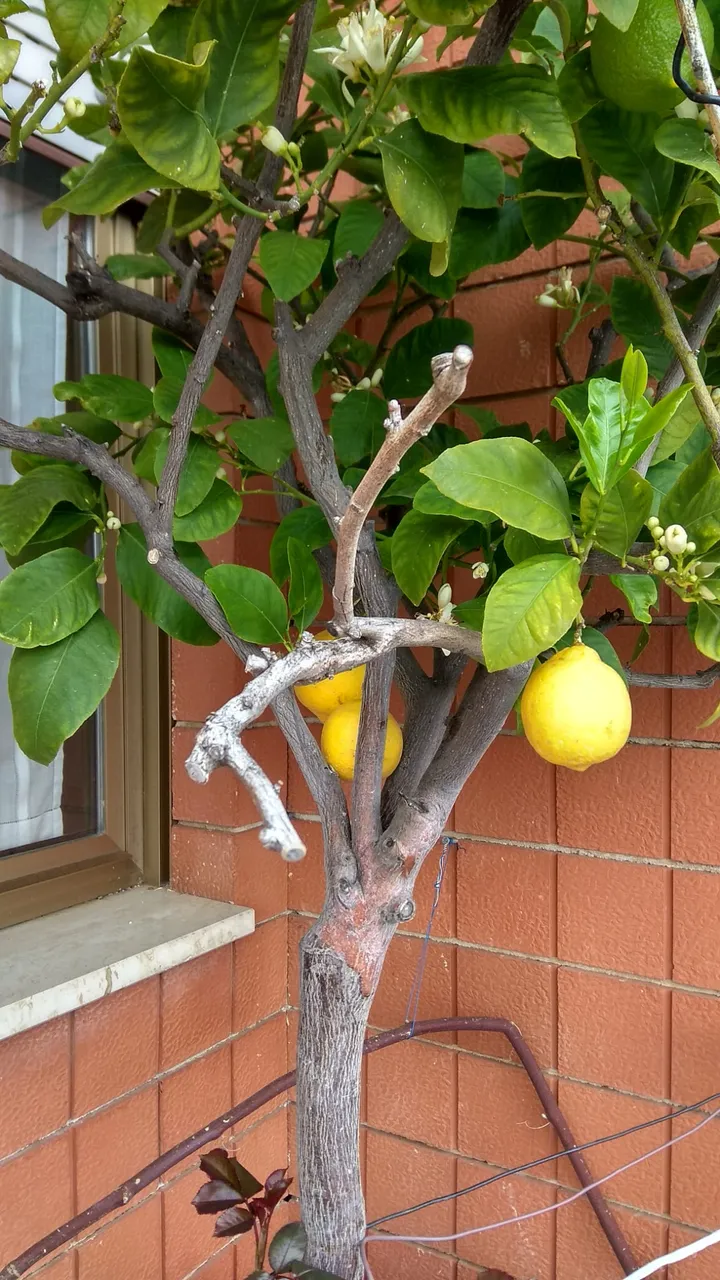Hi, I'm ierondale and this is my first post since my introduction!
@riverflows encouraged me to check out this beautiful community and as soon as I saw it I immediately thought of posting the story of my lemon sapling. I hope you enjoy my post, happy reading!

This is a small glimpse of my lemon tree.
After their wedding my parents decided to buy a lemon seedling to celebrate their new home. Now, almost 30 years later, that little plant has grown into a strong, hardy tree!
6 reasons why everyone should have a lemon plant:
- They contain vitamin C and many minerals such as potassium, calcium and phosphorus
- They have antioxidant and antibacterial effects
- They promote digestion
- When used with honey they help relieve sore throats
- They have a good fragrance
- It is beautiful to watch them grow.
If I have convinced you to get a seedling then read on for some tips on how to manage it!

The lemon tree needs a mild climate to grow well, that's why if you live in areas with wide climate variations, or colder weather, it's better to grow your plant in a pot rather than in the ground.
In this article I'm going to talk specifically about growing in pots, as this is the one I'm most familiar with.
I think the secret to good growth is to give the right care to the plant, few but effective.
Climate
It is very important to give it lots of sun and cover it with a towel during the cold months. For the first periods we used a plastic sheet, but we realized that it wasn't the right material because it " suffocated" the plant being to much aggressive, so we switched to a cotton sheet because it protects the plant from wind and hail, but allows it to breathe. We also placed it in a corner of our balcony in order to be well protected from two sides.
In our city there is a lot of wind, that's why we created a wire structure to hook the sheet to when we use it to prevent it from flying away or bumping into the plant.

Water
Lemon tree is a plant that needs a lot of water, especially in the hot months when it should be watered almost every day.
If it's kept in a pot, as in our case, it is very important to put a saucer to hold the excess water so that it has a reserve to draw from in case it needs it.
Fertilizer
We mainly use 2 things to fertilize it: coffee grounds and fava bean skins.
You have to be careful with coffee grounds because they contain many nutrients like nitrogen, calcium or magnesium, but if used in excess they can become moldy and damage the plant, so the trick is to store the coffee grounds in a small box and sprinkle them on the soil from time to time.
Another way to use them safely is to combine them with other organic fertilizing material, such as in our case fava bean skins because they do not give off a bad smell even if left outdoors for several days.
Remember, if you see that the plant has not yet decomposed the previous materials, do not use new fertilizers, give it some time to absorb everything.

Quick reminder: give the little lemons time to grow and turn yellow, don't pick them earlier, and also remember that once they are grown they can last on the plant for up to two months!


Albero di limone

Questo è un piccolo scorcio del mio albero di limone.
Dopo le nozze i miei genitori decisero di comprare una piantina di limone per inaugurare la loro nuova casa, adesso, dopo quasi 30 anni quella piccola pianta è diventata un albero forte e resistente!
6 motivi per cui tutti dovrebbero avere una pianta di limone:
- Contengono vitamina C e molti minerali come potassio, calcio e fosforo
- Hanno effetti antiossidanti e antibatterici
- Favoriscono la digestione
- Se usati con il miele aiutano a lenire il mal di gola
- Hanno un buon profumano
- È bellissimo guardarli crescere.
Se vi ho convinto a prendere un piantina allora continuate a leggere l'articolo per alcuni consigli su come gestirla!

L'albero di limone ha bisogno di un clima mite e caldo per poter crescere bene, è per questo che se si abita in zone sottoposte ad ampie variazioni climatiche, oppure più fredde è consigliabile coltivare la propria pianta in un vaso piuttosto che a terra.
In questo articolo parlerò nello specifico della coltivazione in vaso, essendo quella che mi è più familiare e su cui potrei avere qualche consiglio da dare!
Penso che il segreto per una buona crescita sia dare le giuste cure alla pianta, poche ma efficaci.
Clima
È molto importante farle prendere tanto sole e coprirla con un telo durante i mesi freddi.
Per i primi periodi abbiamo usato un telo di plastica, ma ci siamo resi conto che non era il materiale adatto poiché "opprimeva" la pianta essendo un materiale troppo aggressivo, siamo passati così ad un telo di cotone perché ripara la pianta dal vento e dalla grandine, ma le permette di respirare. Inoltre l'abbiamo posizionata in un angolo sul nostro balcone, così da essere ben protetta da due lati.
Nella nostra città c'è molto vento, per questo abbiamo creato una struttura di fili a cui agganciare il telo quando lo usiamo, per evitare che voli via o che sbatta contro la pianta.

Acqua
È una pianta che necessita di molta acqua, soprattutto nei mesi caldi quando va annaffiata quasi ogni giorni.
Se la si tiene in un vaso, come nel nostro caso, è molto importante metterle un sottovaso per trattenere l'acqua in eccesso in modo che abbia una riserva da cui attingere nel caso in cui ne abbia bisogno.
Concime
Usiamo principalmente 2 cose per concimarlo: i fondi di caffè e le bucce di fava.
Bisogna stare attenti con i fondi di caffé perché contengono molti nutrienti come l'azoto, il calcio o il magnesio, ma se usati in eccesso possono ammuffire e danneggiare la pianta, quindi il trucco è conservare i fondi di caffè in una scatolina e ogni tanto spargerli sul terreno.
Un altro modo per usarli in sicurezza è accompagnati ad altro materiale organico fertilizzante, come nel nostro caso le bucce di fave perché non danno un cattivo odore anche se lasciate all'aperto per diversi giorni.
Mi raccomando, se vedete che la pianta non ha ancora decomposto i materiali precedenti, non usate nuovi concimi, datele del tempo per assorbire tutto.

Piccolo reminder:
Lasciate il tempo ai piccoli limoni di crescere e diventare gialli, non raccoglieteli prima, e ricordate anche che una volta cresciuti possono resistere sulla pianta anche per due mesi!

